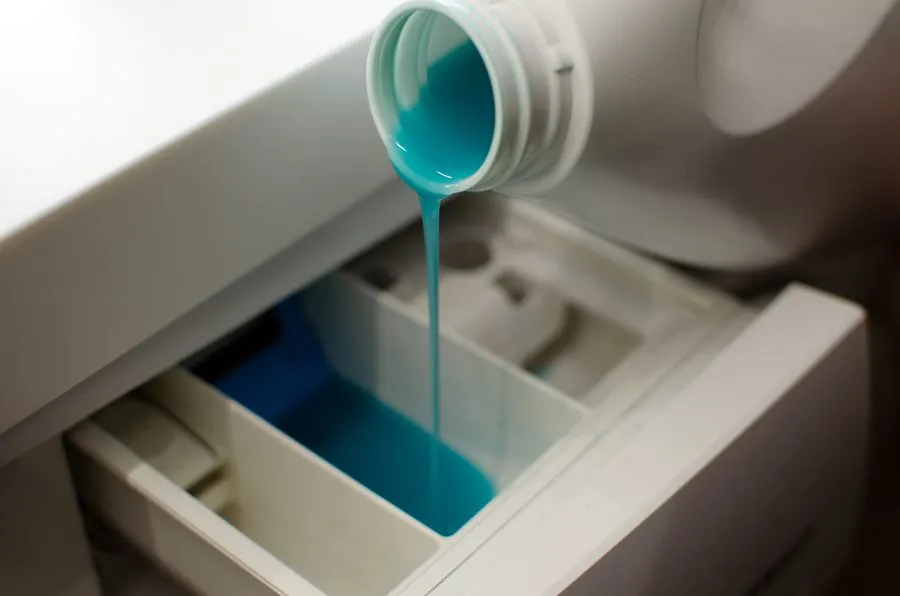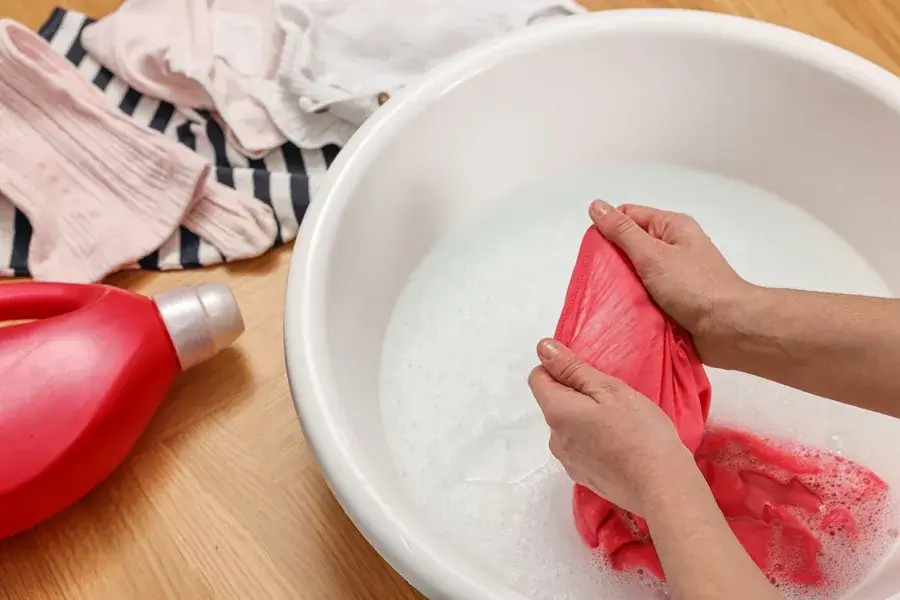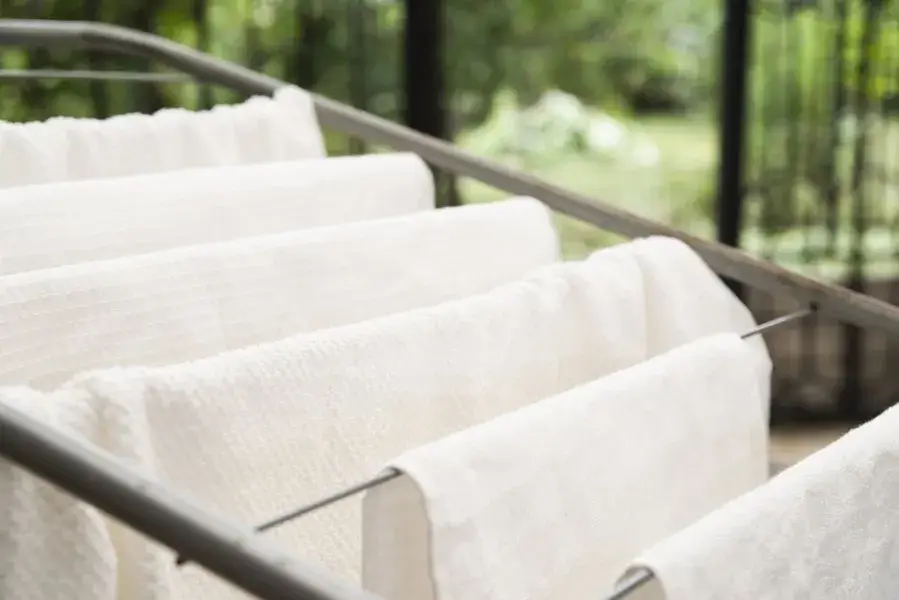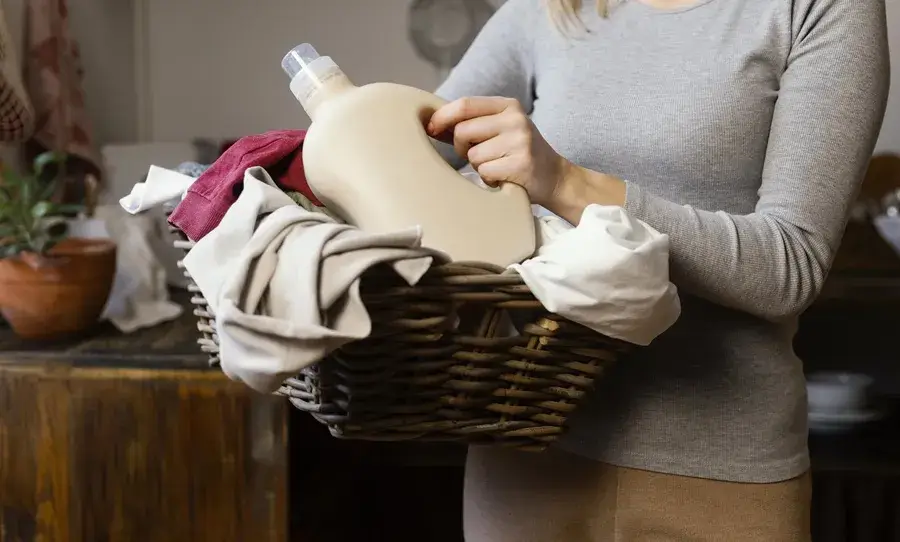Still not sure how to choose a non-toxic laundry detergent? In this article, we’ve put together reviews of the best options that are safe for both your clothes and your health, a quick ingredient guide to help you know what to look for, and even a simple DIY laundry detergent recipe you can make at home in just a few minutes. Let’s dive into the fresh world of clean laundry!
Key Factors: How to Find the Best Natural Laundry Detergent
The devil is in the details, and the secret to a great detergent is in its ingredients. We’ve put together a list of what to avoid and what to look for instead. Don’t forget to save it!
Look for:
- Coconut or sugar-based surfactants — listed as Coco-Glucoside, Decyl Glucoside, Lauryl Glucoside, or Sodium Coco-Sulfate. Gentle and biodegradable.
- Sodium carbonate or sodium percarbonate (for whites)— appears as Sodium Carbonate (Washing Soda) or Sodium Percarbonate. Great for lifting stains and brightening whites.
- Enzymes (protease, amylase, etc.) (for grease and sweat stains)— usually written as Protease, Amylase, Lipase, or just Enzymes.
- Sodium citrate (for better water softening)— listed as Sodium Citrate or Citric Acid Salt. Helps boost cleaning power by softening hard water.
- Plant-based soap — look for Soap (Sodium Olivate, Sodium Cocoate, Sodium Palmate)or any saponified oils like saponified coconut oil.
- Safety certifications — such as Ecolabel, COSMOS, or Ecocert are often displayed on the front or back of the packaging. These guarantee environmentally safe and non-toxic formulas.
Avoid:
- SLS/SLES— listed as Sodium Lauryl Sulfate or Sodium Laureth Sulfate. Common in high-foaming products.
- Phosphates and phosphonates— look for terms like phosphate, phosphonate, or triphosphate in the ingredient list.
- Synthetic fragrances and dyes— usually labeled as fragrance, parfum, colorant, or with CI numbers (e.g., CI 42090).
- Optical brighteners— often shown as optical brighteners, fluorescent whitening agents (FWA), or ingredients with stilbene.
To make informed choices, look for products that are transparent about their ingredients and certified by trusted organizations.

Understand Your Needs
General-purpose detergents are great for everyday light laundry. But when it comes to tough stains, delicate fabrics, dark clothes, or baby items, it’s better to go for something more specific. To help you choose, we’ve put together a few of our favorite options for different laundry needs.
Best Detergents for Baby Clothes
Choose hypoallergenic detergents that are free from harsh chemicals, artificial fragrances, and chlorine.
The best options include:
A liquid detergent made with plant-based ingredients. Free from fragrances, dyes, and optical brighteners. Safe for cloth diapers and cruelty-free.
Laundry pods are designed for sensitive skin. Plant-based, fragrance-free, EPA Safer Choice certified. Plastic-free packaging and carbon-neutral shipping.
Powder detergent with an unscented option suitable for babies. Refillable, plastic-free packaging. Free from sulfates and parabens. Supports 1% for the Planet.
For Allergies and Sensitive Skin
If anyone in your home has sensitive skin or allergies, don’t rely only on the “hypoallergenic” label. Always check the ingredients for synthetic fragrances, enzymes, and dyes.
Recommended:
A concentrated laundry gel suitable for sensitive skin. Can also be used for treating stains or cleaning carpets. Vegan, cruelty-free, and comes in 100% recyclable packaging.
A 100% natural laundry soap bar with no plastic packaging. Lightly scented with bergamot and lemongrass. Certified by Ecocert and the Vegan Society.
Top Non-Toxic Detergents for Delicates
Silk, wool, lace, or merino often require gentle care and sometimes hand-washing. Avoid powders and strong stain removers.
Try:
A gentle liquid detergent designed for delicate fabrics, suitable for both hand and machine washing. Made with plant-based ingredients and packaged in a 100% recycled plastic bottle.
Hypoallergenic and cruelty-free liquid detergent for hand-washing and delicate cycles. Free from dyes, sulfates, and petrochemicals, and gentle on sensitive skin.
Delicate laundry pods are made in the USA with naturally derived ingredients. Free from phosphates and toxins, and safe for washing delicate fabrics.
Eco-Friendly Detergents for Dark and Black Clothes
The main thing is to keep the color from fading and avoid those annoying white marks.
Go for detergents made for dark clothes — or at least check that they don’t have any brightening agents.
Use:
Eco-friendly laundry detergent in tablets, available fragrance-free or in a light Spring Bloom scent. Made without dyes or bleach and packaged in compostable materials—an ideal low-waste option.
Wash dark clothes at temperatures below 30°C and avoid drying them in direct sunlight. Use liquids or soap instead of powder to prevent white residue.
Natural Brighteners for Whites
Use natural brightening ingredients like oxygen bleach. Look for labels indicating “for whites” or “whitening.”
Best options:
A fragrance-free and hypoallergenic laundry powder with minimal ingredients. Safe for cloth diapers, handwashing, HE machines, and septic systems. EPA Safer Choice Certified.
Unscented and non-toxic powder detergent with no brighteners or dyes. Safe for kids, pets, sensitive skin, and HE machines. Made with a bio-based, eco-friendly formula.
Made with coconut oil-based soap, this powder detergent is great for sensitive skin. Certified MADE SAFE, vegan, and B Corp. Available in unscented and lightly scented options. Comes in low-waste, responsible packaging.
Natural Stain Removers That Work
Try:
A fragrance-free stain spray made with 98.95% natural ingredients and 6 plant-based enzymes. Safe for all washable fabrics and gentle enough for baby clothes.
Made with 98% naturally derived ingredients. PETA certified and vegan. Safe for all water temperatures and washable fabrics, with an easy-to-use spray application.

DIY Non-Toxic Laundry Detergent Recipe
Prepare:
- 1 cup castile soap;
- 5 cup of baking soda;
- 4 cups of hot water;
- 25 cup of vinegar ( removes soap residue);
- 10–15 drops of fresh essential oil.
Take gentle care of your clothes right at home. Keep your favorite pieces looking great for longer, while protecting your soft skin — and the planet — with your favorite non-toxic laundry detergent.
FAQ
Is vinegar safe to use as a fabric softener in my laundry?
Are there any downsides to using DIY laundry detergent?
DIY detergents may lack the gentle formulation needed for delicate fabrics (e.g., wool, silk, or technical athletic wear).
Which essential oils can I use in my DIY laundry detergent?
The most popular choice is lavender, eucalyptus, lemon, and tea tree oil because they have antibacterial effects and a nice smell.

Author

Alexandra Mukhina
Content writer on https://rythmoftheworld.com Experienced linguist and translator with a knack for crafting and refining diverse content. My goal is to produce engaging, informative texts that captivate readers. Passionate about reading, music, traveling, and exploring new avenues of personal growth.



